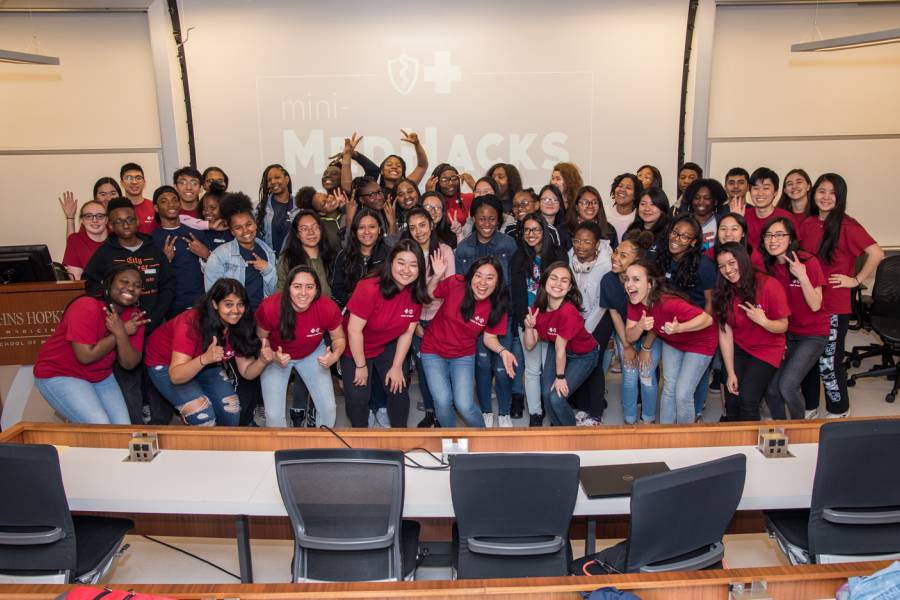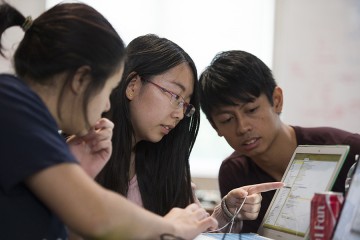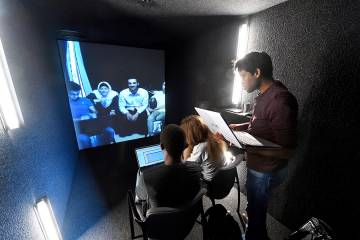Some teenagers spend their weekend mornings sleeping in or watching television. But by 9 a.m. this past Saturday, 35 sophomores from Baltimore City Public Schools were already settling into a room in the Armstrong Building on the Johns Hopkins East Baltimore campus, ready to develop ideas for technologies that would help solve problems faced by the medical community.
The students were there for Mini-MedHacks, a one-day, five-hour medical hackathon hosted by the Johns Hopkins University student organization MedHacks. The event was presented along with Merit Health Leadership Academy, an organization aimed at empowering high school students from underrepresented groups to become leaders in the health care fields.
"All the kids in Merit are in the program because they're interested in medicine, but what they probably don't know is that the future of medicine and what is current in the field is constantly changing due to innovation," said Emily Burnette, a junior biomedical engineering and economics double major at JHU and a member of MedHacks. "Recently there has been a big boom of innovation in this industry, so teaching them about that innovation, what it means, and how exciting all these new changes are will help them understand a different side of medicine."
The day began with an informational panel session featuring four experts from the medical field: Damini Agarwal, a biomedical engineer from Infinite Biomedical Technologies who received her master's from Johns Hopkins in 2017; Robin Yang, an associate professor in the Department of Plastic Surgery in the Division of Pediatric Plastic Surgery; Sarah Korth, director of Kennedy Krieger Institute's Limb Differences Clinic; and Dolores Njoku, program director for pediatric anesthesiology at Johns Hopkins Medicine. They described issues and challenges in their fields, such as how to deliver medical care to underprivileged people who do not live near hospitals or how those suffering from facial deformities experience issues of self-esteem.
The high school students would later discuss those issues and brainstorm possible new technologies to solve them. But first, they took part in two practical workshops. The first, headed by Johns Hopkins students from the Health and Medical Device Network, was a hands-on activity focused on how to operate an Arduino circuit board. The second was led by members of several design teams from Hopkins' Department of Biomedical Engineering, who walked the students through the nine-step engineering process they use when designing a technology.
The workshops were the most exciting part of the day for Shantika Bhat, a Baltimore Polytechnic Institute student.
"It was a lot of fun going through the engineering design process because it's beneficial for everyone and such a universal concept," said Bhat. "No matter what I end up wanting to do professionally, learning useful processes like that will help me succeed."
After the workshops, the student groups put the engineering design process to work by trying to solve some of the issues the panelists had highlighted. All 25 members of MedHacks working at the event made themselves available to listen to student ideas and help them problem solve.
At the end of the two-hour work period, each group either had created a design prototype out of simple items such as cardboard or had drawn their ideas onto sheets of paper. The students also created five-minute PowerPoint presentations about their projects, which they presented to a panel of judges who graded them in a variety of areas, including if the project had a large potential impact, as well as how feasible it was. Project ideas included an urgent-care kiosk stocked with medical supplies for rural areas and a permanent prosthetic limb for children that grows as the child grows.
The stakes were raised after the grading was completed when the MedHacks student organizer for the event, Elle Park, a sophomore computer science major, revealed that the students from the winning group would each receive $15 Amazon gift cards. The winning team was a group of five students that came up with a social media app intended to help boost confidence and a sense of community among people with facial defects.
Adamaris Bautista, who attends Mergenthaler Vocational Technical High School, said she enjoyed her time spent at Mini-MedHacks. She said she expects the experience will inspire her peers to start reconsidering what areas of the medical field they want to pursue.
"Mini-MedHacks was really cool because it opened us up to stuff we weren't even considering," Bautista said. "Someone may be coming into Mini-MedHacks thinking they want to be a psychologist but could be coming out of it wanting to be a bioengineer, and it would be because of this fantastic opportunity we've been given."
Posted in Science+Technology, Student Life, Community
Tagged community, hackathon, baltimore city public schools, design competitions










